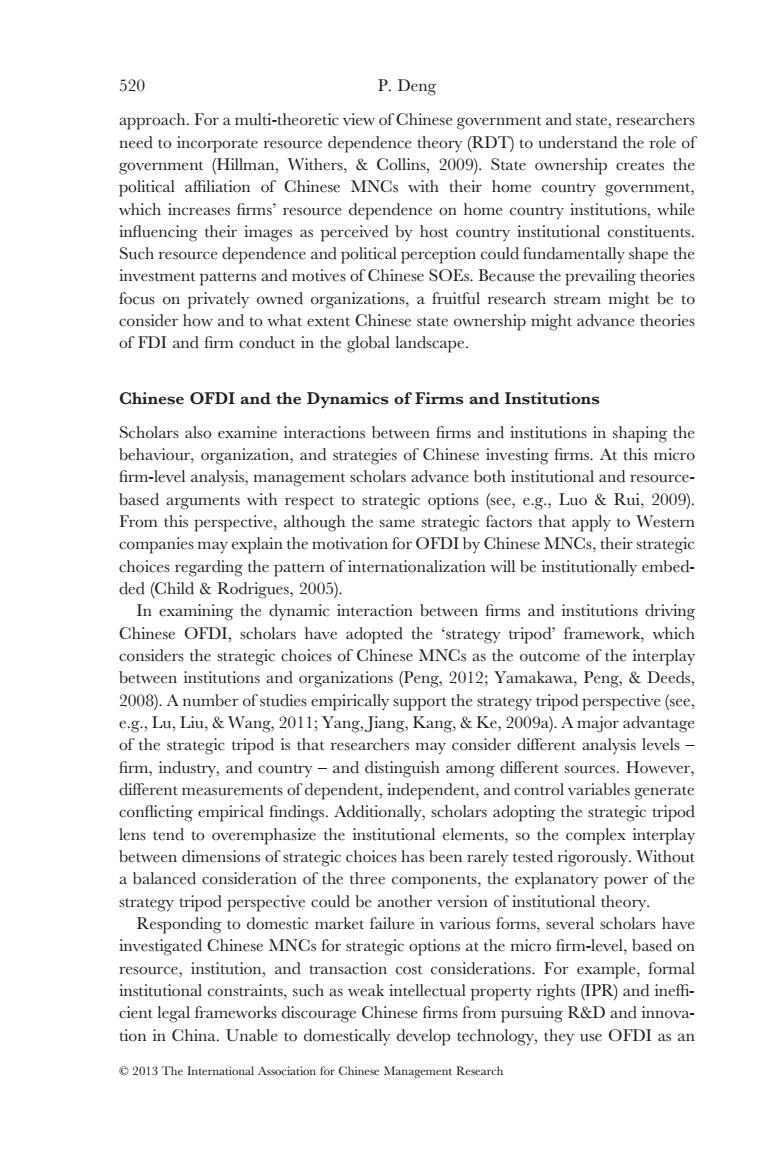正在加载图片...

520 P.Deng approach.For a multi-theoretic view of Chinese government and state,researchers need to incorporate resource dependence theory(RDT)to understand the role of government (Hillman,Withers,Collins,2009).State ownership creates the political affiliation of Chinese MNCs with their home country government which increases firms'resource dependence on home country institutions,whil influencing their images as perceived by host country institutional constituents Such resource dependence and political perception could fundamentally shape the investment patterns and motives of Chinese SOEs.Because the prevailing theories focus on privately owned organizations,a fruitful research stream might be to consider how and to what extent Chinese state ownership might advance theories of FDI and firm conduct in the global landscape. Chinese OFDI and the Dynamics of Firms and Institutions Scholars also examine interactions between firms and institutions in shaping the nvesting firms.At this micro eent ho advnc n based arguments with respect to strategic options (see,e.g.,Luo Rui,2009) From this perspective,although the same strategic factors that apply to Western companies may explain the motivation for OFDI by Chinese MNC their strateg choices regarding the pattern of internationalization will be institutionally embed ded (Child Rodrigues,2005). In examining the dynamic interaction between firms and institutions driving Chinese OFDI,scholars have adopted the strategy tripod'framework,whic considers the strategic choices of Chinese MNCs as the outcome of the interplay between institutions and organizations(Peng,2012;Yamakawa,Peng,Deeds 2008).A number of studies e mpirically supp port the s tripod perspective(see egLu,Liu,&Wang,2011;Yang,Jiang,Kang&Ke,2009a)A major advantage of the strategic tripod is that researchers may consider different analysis levels firm,industry,and country-and distinguish among different sources.However, different meas ments of dependent,independent,and gene conflicting empirical findings.Additionally,scholars adopting the strategic tripod lens tend to overemphasize the institutional elements,so the complex interplay between dimensions of strategic choices has been rarely tested rigorously.Without a balanced consideration of the three components,the explanatory power of the strategy tripod perspective could be another version of institutional theory. Responding to domestic market failure in various forms.several scholars have investigated Chinese MNCs for strategic options at the micro firm-level,based on resource e,institution,and transaction cost considerations.For example forma institutional constraints,such as weak intellectual property rights(IPR)and ineffi- cient legal frameworks discourage Chinese firms from pursuing R&D and innova- tion in China.Unable to domestically develop technology,they use OFDI as an 2013 The International Asociation for Chinese Management Researchapproach. For a multi-theoretic view of Chinese government and state, researchers need to incorporate resource dependence theory (RDT) to understand the role of government (Hillman, Withers, & Collins, 2009). State ownership creates the political affiliation of Chinese MNCs with their home country government, which increases firms’ resource dependence on home country institutions, while influencing their images as perceived by host country institutional constituents. Such resource dependence and political perception could fundamentally shape the investment patterns and motives of Chinese SOEs. Because the prevailing theories focus on privately owned organizations, a fruitful research stream might be to consider how and to what extent Chinese state ownership might advance theories of FDI and firm conduct in the global landscape. Chinese OFDI and the Dynamics of Firms and Institutions Scholars also examine interactions between firms and institutions in shaping the behaviour, organization, and strategies of Chinese investing firms. At this micro firm-level analysis, management scholars advance both institutional and resourcebased arguments with respect to strategic options (see, e.g., Luo & Rui, 2009). From this perspective, although the same strategic factors that apply to Western companies may explain the motivation for OFDI by Chinese MNCs, their strategic choices regarding the pattern of internationalization will be institutionally embedded (Child & Rodrigues, 2005). In examining the dynamic interaction between firms and institutions driving Chinese OFDI, scholars have adopted the ‘strategy tripod’ framework, which considers the strategic choices of Chinese MNCs as the outcome of the interplay between institutions and organizations (Peng, 2012; Yamakawa, Peng, & Deeds, 2008). A number of studies empirically support the strategy tripod perspective (see, e.g., Lu, Liu, & Wang, 2011; Yang, Jiang, Kang, & Ke, 2009a). A major advantage of the strategic tripod is that researchers may consider different analysis levels – firm, industry, and country – and distinguish among different sources. However, different measurements of dependent, independent, and control variables generate conflicting empirical findings. Additionally, scholars adopting the strategic tripod lens tend to overemphasize the institutional elements, so the complex interplay between dimensions of strategic choices has been rarely tested rigorously. Without a balanced consideration of the three components, the explanatory power of the strategy tripod perspective could be another version of institutional theory. Responding to domestic market failure in various forms, several scholars have investigated Chinese MNCs for strategic options at the micro firm-level, based on resource, institution, and transaction cost considerations. For example, formal institutional constraints, such as weak intellectual property rights (IPR) and ineffi- cient legal frameworks discourage Chinese firms from pursuing R&D and innovation in China. Unable to domestically develop technology, they use OFDI as an 520 P. Deng © 2013 The International Association for Chinese Management Research